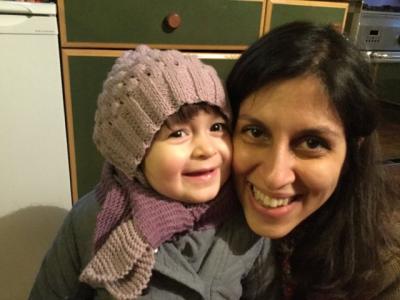July 22, 2016

One of the interrogators of British-Iranian Nazanin Zaghari-Ratcliffe has told her family Britain should be pressured to make “an agreement” with Iran to free her.
There was no hint what sort of agreement was intended, but there has been speculation Iran wants some sort of prisoner exchange, like the one it arranged with the United States in January. Iran, however, has not previously indicated that Britain is holding any Iranians it wants. Britain is only known to have Iranians in jail on drug charges and violent offenses, uo to and including murder.
Zaghari-Ratcliffe’s husband, Richard, told Reuters this week that in late June his wife’s lead interrogator presented an unusual proposal when he spoke to Nazanin’s parents in Tehran: her husband should pressure the UK government “to reach an agreement” and in exchange her case would be closed before going to court.
The interrogator did not give any further details on what the agreement would entail, Ratcliffe said.
He said he relayed the proposal to the UK Foreign Office and was told they had no information about any potential agreement being sought by Iran.
The interrogator also told Nazanin’s mother during a visit to Evin Prison last Wednesday that the agreement he was referring to was an “exchange,” Ratcliffe said.
The UK Foreign Office told Reuters it has raised Zaghari-Ratcliffe’s case with Iranian Foreign Minister Mohammad-Javad Zarif and other senior Iranian officials but its representatives in Tehran have not been granted access to her. Iran does not recognize dual citizenship and never allows access to foreign gov- ernments who seek access to imprisoned dual nationals.
At least seven dual nationals are being held currently by the Islamic Republic—two Americans, two Canadians, two Britons and one French woman. Four of them—one from each nationality—have been jailed since the Iran-US prisoner exchange in January. But there has been no hint, at least until now, that Iran envisioned using any of them in a prisoner exchange.
Hostage-taking for political goals was most prominent in the 1980s when the Lebanese Hezbollah, which was founded, trained and funded by Iran, took numerous Western hostages, including Americans. The complex deal to swap those US hostages for arms shipped to Iran became known as the Iran-Contra affair.
Last January, four Iranian-Americans held in Iran were released in exchange for seven Iranians held or charged in the US, mostly for sanctions violations. Six of them were dual nationals; none of them has returned to Iran since their release, preferring to stay in the United States.
Britain is not known to have any Iranians in prison for violating its sanctions on Iran.
Zaghari-Ratcliffe’s two-year-old daughter was taken from her upon her arrest and is living with her parents in Tehran.